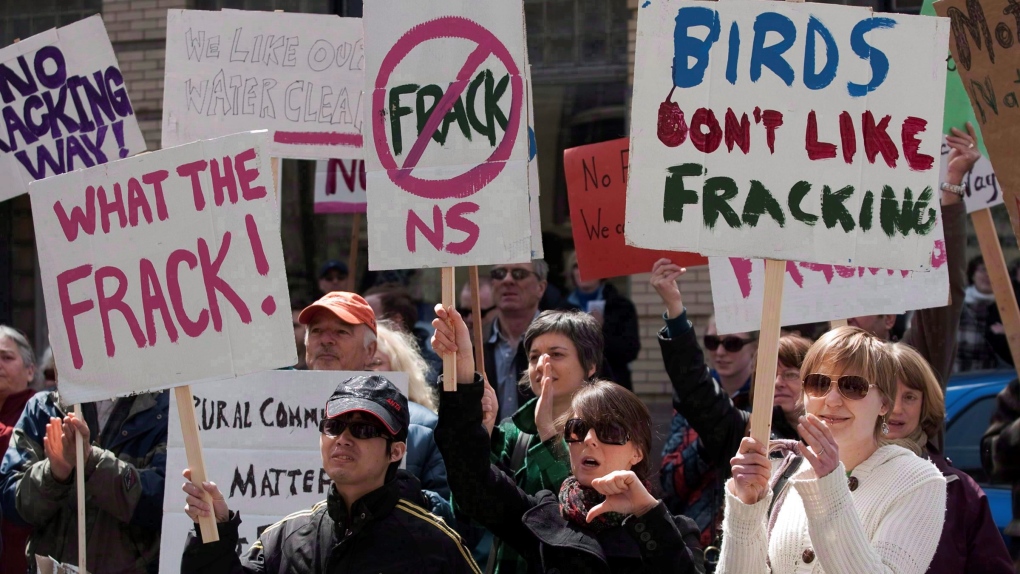Homes near B.C. fracking sites have more pollutants: study on health impacts
 Protesters gather outside the Nova Scotia legislature in Halifax to show their opposition to the use of hydraulic fracturing or fracking, on Friday, April 22, 2011. (Andrew Vaughan / THE CANADIAN PRESS)
Protesters gather outside the Nova Scotia legislature in Halifax to show their opposition to the use of hydraulic fracturing or fracking, on Friday, April 22, 2011. (Andrew Vaughan / THE CANADIAN PRESS)
A new study has found homes close to fracking oil and gas wells in British Columbia have higher levels of certain organic pollutants, which may lead to short- and long-term health effects.
Elyse Caron-Beaudoin, lead author and a professor in the department of health and society at the University of Toronto, Scarborough, says researchers took water and air samples from the homes of 85 pregnant women in the Peace River area of B.C. for one week.
She says pregnant women were recruited for the study because of the potential negative health effects of living close to natural gas wells, including higher rates of pre-term births, low birth weight and heart malformations.
Caron-Beaudoin says results showed that air samples in the homes had higher levels of chemicals used in fracking such as acetone and chloroform, and those contaminants were found in their study subjects.
She says Canada is one of the largest producers of natural gas in the world using fracking, a process that injects fluids deep underground to release the gas, yet there are no studies on the potential health impacts of the industry.
B.C. has about 10,000 active wells, and the study says the area could potentially see an increase in their number to more than 100,000.
CTVNews.ca Top Stories

Outdated cancer screening guidelines jeopardizing early detection, doctors say
A group of doctors say Canadian cancer screening guidelines set by a national task force are out-of-date and putting people at risk because their cancers aren't detected early enough.
Mussolini's wartime bunker opens to the public in Rome
After its last closure in 2021, it has now reopened for guided tours of the air raid shelter and the bunker. The complex now includes a multimedia exhibition about Rome during World War II, air raid systems for civilians, and the series of 51 Allied bombings that pummeled the city between July 1943 and May 1944.
'I just started crying': Blue Jays player signs jersey for man in hospital
An Ontario woman says she never expected to be gifted a Blue Jays jersey for her ailing husband when she sat alone at the team’s home opener next to a couple of kind strangers.
LIVE @ 4 EDT Freeland to present 2024 federal budget, promising billions in new spending
Canadians will learn Tuesday the entirety of the federal Liberal government's new spending plans, and how they intend to pay for them, when Deputy Prime Minister and Finance Minister Chrystia Freeland tables the 2024 federal budget.
B.C. woman facing steep medical bills, uncertain future after Thailand crash
The family of a Victoria, B.C., woman who was seriously injured in an accident in Thailand is pleading for help as medical bills pile up.
Step inside 'The Brain': Northern education tool aims to promote drug safety
An immersive experience inside a massive dome coined 'The Brain' is helping youth learn about brain function and addiction
WATCH Half of Canadians living paycheque-to-paycheque: Equifax
As Canadians deal with a crushing housing shortage, high rental prices and inflationary price pressures, now Equifax Canada is warning that Canadian consumers are increasingly under stress"from the surging cost of living.
Ontario woman charged almost $7,000 for 20-minute taxi ride abroad
An Ontario woman was shocked to find she’d been charged nearly $7,000 after unknowingly using an unauthorized taxi company while on vacation in January.
Inmate who escaped from N.B. prison has long history of violent crimes
An inmate who escaped from Dorchester Penitentiary in Dorchester, N.B., on Saturday evening has a long history of violent crimes and a history of escaping custody.































